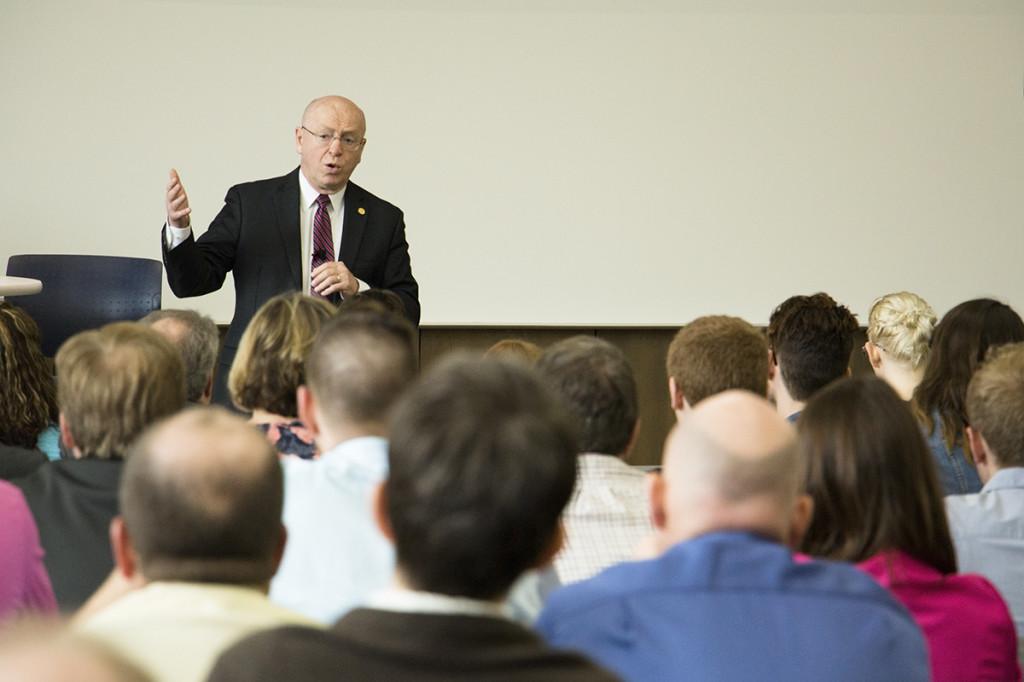Cross: System cuts reflect value shift
In public forum, UW System president stresses efforts to reduce cuts, boons of public authority model
Photo by Anna Mateffy
Ray Cross, UW System president, spoke about proposed budget cuts to the university system at an open forum for UW-Eau Claire faculty, staff and students Wednesday afternoon in Centennial Hall. Cross touched on challenges ahead for the UW System and his efforts lobbying state lawmakers to ease the cut.
April 1, 2015
Expected UW System cuts illustrate a state priority shift away from public education, UW System President Ray Cross told an audience at UW-Eau Claire Wednesday.
With the proposed $300 million funding cut in the 2015-17 state budget, lawmakers — and the public — told the UW System it’s not a bedrock investment, Cross said during a question-and-answer session in Centennial Hall.
“I look at legislators as the mouthpiece of the public,” Cross said. “So the public is telling us ‘we don’t value higher education as much as you do, Ray Cross. We would like to see our resources spent elsewhere.’”
Cross said he’s lobbying lawmakers to reduce the size of the cut and highlight the System’s value to the state, while campuses System-wide prepare to shave staff and resources.
Gov. Scott Walker’s biennial budget would freeze tuition across the UW System and amount to a $7.5 million state funding cut to Eau Claire over the next two years.
Eau Claire Chancellor James C. Schmidt extended a voluntary separation incentive to 324 faculty and staff members on March 12. Schmidt formed four “rapid action task forces” to preserve budget priorities and streamline processes ahead of the cuts.
Walker also froze tuition across the UW System in the 2013-15 state budget — the first two-year freeze in the UW System’s 43-year history.
Eau Claire plans to cut about 27 Full Time Equivelent faculty and staff positions to even an existing $4.5 million budget deficit by about $2.8 million, and will need to eliminate more positions to comply with state budget cuts.
Chancellor Schmidt’s separation incentive offers 50 percent of an employee’s base salary to five-year UW System veterans 55 and older in exchange for early retirement from Eau Claire.
Schmidt also formed four “rapid action task forces,” Feb. 16, trusted to sculpt budget priorities ahead of upcoming cuts.
The four task forces will present suggestions to streamline campus student services, administration, curriculum and academic workload.
Tim Vaughan, chair of the curriculum task force, said his committee will recommend condensing degree requirements, identifying which classes need to remain small and retaining freshmen for year two.
“In the end there are going to be hard decisions,” Vaughan said. “There needs to be some rational thought.”
The academic workload task force will recommend an advising center in each academic department, in favor of the current model, where most faculty are charged with juggling teaching, research and and advising, Carter Smith, chair of the academic workload task force, said.
The administration task force will recommend consolidating departments in Eau Claire offices. That, for example, means rolling marketing and printing bureaus under the same roof, and forming a service center to address employee paperwork problems, Kristen Hendrickson, chair of the administration task force said.
Cross said Wednesday that administration System-wide will need to be restructured ahead of the cuts.
“It is true that administrative functions have grown disproportionately,” Cross said
System surplus spawns suspicion
In April 2013, a Legislative Fiscal Bureau Report revealed the UW System held about $600 million in cash reserves. In 2014, those reserves totaled about $1 billion. Between 2002 and 2012, tuition climbed 134 percent.
Matt Jewell, Eau Claire materials science professor, asked Cross if state lawmakers expect the UW System to use its reserve account to offset the state budget cut, during the forum Wednesday.
“Do you have a sense of how much the fund balances is going to be spent down in the next biennium, and do they want us to go to zero?” Jewell said.
“The answer is yes, they do,” Cross replied. “Because they look at us as a state agency, and a state agency has to be zero.”
Cross said the “fund balance fiasco” painted an unfavorable portrait of the UW System. Lawmakers expect the System to use that fund balance to even state budget cuts.
The System didn’t clearly communicate why it held large cash reserves, Cross said. The System kept its reserves “off-books,” meaning they didn’t appear in the System’s annual budget.
Cross said it’s unrealistic to expect the System to operate without reserves — that’s why the business community didn’t speak out after the reserve account was revealed.
“It was in our annual report but we should have been forthright,” Cross said. “We were fearful — I wasn’t part of it, neither was (Schmidt) so I can say this — that (lawmakers) were going to take it from us. And in the end they are, really.”
Cross on public authority
Cross said he favors a plan in the budget that would dub the UW System a “public authority.”
According to the proposed budget, the plan allows the UW System:
— More control over tuition rates
— More discretion for construction projects, except bidding
— Power to adjust employee compensation
— Oversight of construction projects funded with gifts or grants
— Greater purchasing power
Although Cross said he’d resign if Wisconsin lawmakers tampered too much with the System’s tenure and shared governance systems, he told the crowd both could be tweaked.
Full professors, he said, should be subject to post-tenure review. That means penalties for professors that don’t research and teach to par, and pay raises for those that do.
The public authority plan would fund the UW System through a block grant tied to state sales tax. Currently, the state funds the System through a grant from several revenue sources.
Cross, during the forum Wednesday, ranked Wisconsin — with New York, Rhode Island and Oregon — among the “most regulated” higher education systems in the country, he said.
“Part of our argument is to free us up to be responsive, nimble and accountable,” Cross said.
Scott Lowe, an assistant professor of philosophy and religious studies, said he’s not confident in the future of the UW System. He’s taught at Eau Claire for 11 years, but he’s now looking for a job elsewhere ahead of the proposed cuts.
“I believe Mr. Cross is a smooth and accomplished communicator, which might be what we need dealing with legislators,” he said. “I have no idea if he’s telling the truth.”
Cross said the UW System now competes with K-12 education, transportation and other groups for state funding.
“We are the foundation on which the economy of the future rests,” Cross said “Chipping away at those pillars hurts us.”
Max Garland, Eau Claire English professor, said during the forum that college in his day was largely free.
And education was more affordable for lawmakers in power today, he said; education cuts raise the barrier to success.
“The greatest generation, they were not rich people,” Garland said. “But they invested in America’s greatest gift to the world, not the interstate highway system, not the internet, not McDonald’s, not a man on the moon, but a free or at least affordable education. That’s what tyrants fear.”


